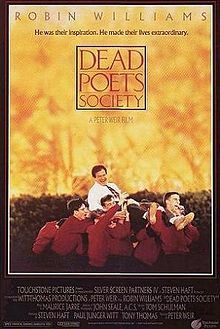RIP Robin Williams ~ Carpe Diem & Dead Poets
RIP Robin Williams (1951-2014)
A tribute to a fellow crazy one - By Cliff Michaels
20 YEARS GO, I walked into a Manhattan deli. Robin Williams and Billy Crystal strolled in behind me. I looked at Billy and said, “You look Maaaahveous!” Billy winked at me. Then I turned to Robin. I said, “Nanu-Nanu & Carpe Diem,” his catch-phrases as Mork from Mork & Mindy and Professor Keating in Dead Poets Society. Robin said, “Kid, make your life extraordinary. If you can’t do that, be funny. Nanu nanu and carpe diem to you!”
Like everyone, I was crushed by Robin’s passing. He was more than a comedy genius and Julliard actor. He was an iconic mentor to millions. He was King of The Crazy Ones … in a good way. He was insecure like all of us, yet he fought for those who couldn’t fight for themselves. As co-founder of Comic Relief, he helped raise over $50 million dollars for the homeless.
Robin navigated the comedy/actor/humanitarian gauntlet with unique aplomb and lunacy. After all, he was Mork, Garp, Hook, Mrs. Doubtfire and sage psychologist Sean. But if I had to choose just one performance that echoes in my soul, it would be his role as Professor Keating in Dead Poets Society (DPS). The film won Best Original Screenplay in 1989 but it was Robin who pushed the Latin phrase “carpe diem” into our pop culture lexicon.
SPOILER ALERT:
In 1990, I wrote a review of Dead Poets Society. Like Robin’s life, DPS shockingly ends with a suicide. However, the entire movie, especially the inspirational final scene, affirms Robin Williams carpe diem spirit. Watch it again and BE INSPIRED!
 To The Virgins
To The VirginsDead Poets Society (DPS) introduces us to a group of teenage boys attending elitist Welton Academy, a conservative prep school with a tradition of honor and discipline. On the first day, students meet their poetry teacher, Professor John Keating (Robin Williams). In a scene for the ages, Keating encourages the boys to “make their lives extraordinary.” He also encourages them to think for themselves.
On the first day of school, Keating asks a student to read a verse from a poem titled: To the Virgins, To Make Much of Time.
“Gather ye rosebuds while ye may, old time is still a flying,
and this same flower that smiles today, tomorrow will be dying.”
“The Latin term for that sentiment is carpe diem,” says Keating. It means, “Seize the day.” Keating then instructs the students to rip out the boring introductory pages of a poetry textbook. The author suggests poems be rated on a mathematical scale, offending Keating’s artistic soul.
Keating’s third lesson of the morning challenges each student to stand on a desk at the front of the room to see the world from a new vantage point. As Thoreau wrote, “The universe is wider than our views of it.”
Discovering an old yearbook from Keating’s Welton days, the boys learn that Keating was once a member of a secret literary club called Dead Poets Society, dedicated to poets who dared to live extraordinary lives. The boys revive the club and embrace its carpe diem spirit.
Tragedy and Triumph
In a series of trips to a secret cave, the boys read from the great poets and become inspired. We soon learn their fears, foibles, and dreams. Todd is uncommonly shy with no path to break out of his shell until Keating shows him how. Knox will now pursue the object of his affection with romantic overtures inspired by Keating’s class. Determined to rock the boat, Charlie submits an anonymous article to the school newspaper on behalf of the Dead Poets Society, suggesting girls be admitted to Welton. Unfortunately, he’s gone too far and is threatened by the headmaster with expulsion for his prank. On his honor however, Charlie refuses to reveal the names of his Dead Poet members.
When Keating hears that his students are in trouble, he tempers the carpe diem mantra with this pearl of wisdom:
“Sucking the marrow out of life doesn’t mean choking on the bone.”
The boys must now come to grips with their actions when defying rules, and in some cases, their parents. This is true for Neil Perry who has a passion for acting, a serious conflict with his father’s plans for him to be a doctor. In an effort to live his dream, Neil secretly takes the lead in a school play. When his father finds out, he pulls Neil from Welton and tells him the next ten years will be spent studying medicine. Hopeless under his father’s tyrannical rule, Neil commits suicide.
In denial over Neil’s death, Mr. Perry demands the Academy launch an investigation. One by one, Neil’s classmates are shuttled into the headmaster’s office, threatened with expulsion and forced to implicate Keating for planting the seeds of independence in the minds of his students. Keating is fired without a hearing.
In the movie’s final scene, the headmaster is teaching from the boring text Keating encouraged the boys to ignore. Keating stands at the doorway. In a daring display of solidarity, half the students look to Keating, and one by one they stand on their desks to say, “Oh, Captain, My Captain.” It’s a verse from a Walt Whitman poem that Keating taught the boys to use when a sense of purpose was called for. While the headmaster screams “sit down”, the boys have already seized the day in loyalty to Keating.
THANK YOU ROBIN
We cherished your maniacal humor and timeless wisdom.
You were a friend to all and will be dearly missed.
~ nanu nanu and carpe diem ~
The post RIP Robin Williams ~ Carpe Diem & Dead Poets appeared first on Cliff Michaels Academy.




